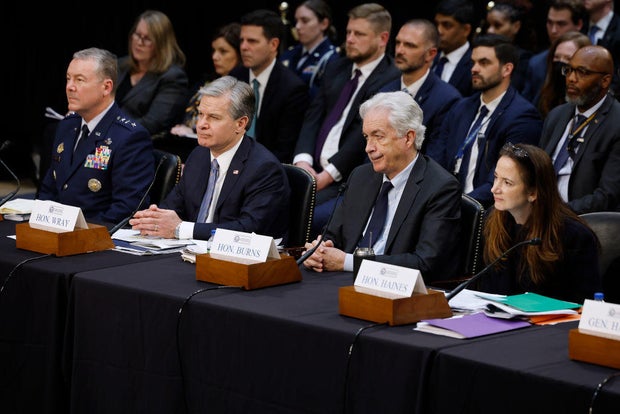Israel’s military will “struggle to neutralize” Hamas’s sprawling underground tunnel systems and is likely to face “lingering armed resistance” from the militant group “for years to come,” according to a new global threat assessment compiled by the U.S. intelligence community.
The risk of escalation of the conflict in Gaza, now stretching into its sixth month, also “remains high,” according to the unclassified report, which was released Monday by the Office of the Director of National Intelligence (ODNI). The analysts who drafted it, however, said neither Iran nor its proxy groups are believed to be seeking direct conflict with the United States.
In accompanying public testimony before the Senate Intelligence Committee on Monday, Director of National Intelligence Avril Haines said the war in Gaza had fueled violent acts by terror groups worldwide.
The crisis “has galvanized violence by a range of actors around the world and, while it is too early to tell, it is likely that the Gaza conflict will have a generational impact on terrorism,” Haines said. “Both al Qaeda and ISIS, inspired by Hamas, have directed supporters to conduct attacks against Israeli and U.S. interests,” she said.
Haines appeared alongside the heads of five major American intelligence agencies for an annual hearing on worldwide threats. CIA director William Burns, FBI director Christopher Wray, Brett Holmgren, head of the State Department’s Bureau of Intelligence and Research, National Security Agency director Gen. Timothy Haugh and Lt. Gen. Jeffrey Kruse of the Pentagon’s Defense Intelligence Agency also testified.
The ODNI assessment, which represents the collective analysis of the 18 intelligence agencies comprising the U.S. intelligence community, also said the “viability” of Israeli Prime Minister Benjamin Netanyahu’s leadership and governing coalition “may be in jeopardy.”
“Distrust of Netanyahu’s ability to rule has deepened and broadened across the public from its already high levels before the war, and we expect large protests demanding his resignation and new elections,” it says. “A different, more moderate government is a possibility.”
President Biden said in a recent interview with MSNBC that he believed Netanyahu was “hurting Israel more than helping Israel” by waging a military campaign that to date has resulted in the deaths of more than 30,000 civilians in Gaza, according to the Gaza Ministry of Health. In a separate interview with Politico, Netanyahu later called Mr. Biden’s critical views “wrong,” and said fighting could end within four to six weeks.
Burns, who returned Saturday from his eighth trip overseas to hold talks with Qatari, Egyptian and Israeli negotiators, testified Monday that a cease-fire was the most effective way to boost the delivery of humanitarian aid into Gaza, where the health ministry has said at least 25 people have already died due to malnutrition.
A former diplomat who has been tapped by Mr. Biden to lead successive rounds of sensitive hostage talks, Burns said a potential three-part agreement — involving the release of hostages in return for a defined number of Palestinian prisoners and an initial six-week cease-fire — remained “on the table.”
“I don’t think anybody can guarantee success,” he said. “What I think you can guarantee is that the alternatives are worse for innocent civilians in Gaza who are suffering under desperate conditions, for the hostages and their families who are suffering, also under very desperate conditions, and for all of us.”
While the 40-page, written intelligence assessment said Iran’s leaders “did not orchestrate nor had foreknowledge” of Hamas’s October 7 attack against Israel — in which more than 1,200 Israelis were killed and more than 250 were taken hostage — it noted Tehran was able to “flex” its proxy network’s military capabilities in the attacks’ aftermath, and would likely remain a threat.
“While Iran will remain careful to avoid a direct conflict with either Israel or the United States, it nonetheless enabled scores of militia rocket, missile, and UAV attacks against U.S. forces in Iraq and Syria; Hizballah exchanges of fire with Israel on the north border with Lebanon; and [Houthi] missile and UAV attacks, both on Israel directly and on international commercial shipping transiting the Red Sea,” analysts wrote.
Ending Ukraine aid could be “massive and historic mistake”
The annual assessment also warned that Moscow was “benefitting” from uncertainties among Western countries about the future of military aid to Ukraine, which has seen recent losses on the battlefield and, absent a renewed flow of assistance, stands to cede more ground to Russian forces in the coming weeks.
“Ukraine’s retreat from Avdiivka and their struggle to stave off further territorial losses in the past few weeks have exposed the erosion of Ukraine’s military capabilities with the declining availability of external military aid,” Haines told Senate lawmakers.
Absent an infusion of military assistance, including a $60 billion aid package that for months has been stalled in Congress, “it is hard to imagine how Ukraine will be able to maintain the extremely hard-fought advances it has made against the Russians,” she said, noting recent support the Kremlin had secured from North Korea and Iran.
“Without supplemental assistance in 2024, you’re going to see more Avdiivkas,” Burns added. “And that, it seems to me, would be a massive and historic mistake for the United States.”
Burns, who has traveled 10 times to Ukraine as CIA director, said Ukraine would, with the benefit of continued aid, be able to hold its own on the front lines into 2025, thereby achieving a stronger negotiating position.
He also warned that the U.S. discontinuing its support to Ukraine would fuel doubts among allies in the Indo-Pacific and “stoke the ambition” of the Chinese government in the Taiwan Strait and South China Sea.
The written assessment warned that Russia’s inability to secure rapid gains in Ukraine “continues to drive concerns that Putin might use nuclear weapons,” noting Putin has made previous public remarks about moving Russian nuclear weapons to Belarus.
The report also noted that the Chinese government had continued supporting Russia’s military campaign by providing the Kremlin with dual-use materials and weapons components, noting China’s exports of supplies “with potential military use rose more than threefold since 2022.” Bilateral trade between Beijing and Moscow exceeded $220 billion in 2023, it said.
The hearing, which traditionally takes place once a year before the intelligence committees of the Senate and House, offers a rare opportunity for lawmakers and the public to hear directly from leaders of American intelligence agencies, whose budgets and activities are kept largely classified.



